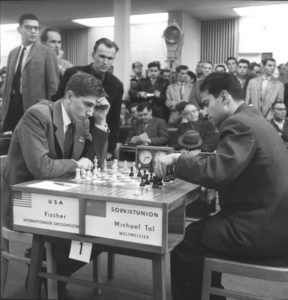
No pantheon of chess legends would be complete without Bobby Fischer, the most famous chess player of all time and one of the most explosive in a field noted for its volatile personalities.
1972. For those of you who don’t remember or weren’t around, that was the year Robert James Fischer became a bona fide American hero. It’s a pity that in the years that followed, Fischer’s achievements were overshadowed by controversy, anti-Semitic rancor, bizarre behavior and personal misfortune. But when Fischer trod the boards, he stomped all over everyone, including the mighty Soviet grandmasters, who, besides dominating world chess, stood as symbols of Soviet superiority on the world’s political stage.
In 1972, the Cold War was still in full swing, and it was by no means a foregone conclusion that the USA would come out on top. Chess was one battlefield in the Cold War where the USA held not so much as a toehold. The reigning champion, Russia’s Boris Spassky, had won the World Championship in 1969 by soundly defeating the previous title holder, Tigran Petrosian, another in a long string of Soviet champions going back nearly uninterrupted to Alexander Alekhine in 1929.
Soviet chess mastery was seen to represent the Soviet’s superior brainpower, just as their fine Olympic athletes symbolized the physical superiority “inherent” in the Communist system. These symbols mattered. America in 1972 was languishing — Viet Nam, deep social division at home, economic woes, and just over the horizon, Watergate. America was thirsting for a hero.
Heroics came in the last place anyone would have expected — chess. A game that was as interesting to the American public as watching paint dry was suddenly on the tip of everyone’s tongue when, during the preliminary matches for the 1972 World Championship, American Bobby Fischer mowed down every opponent he faced, culminating in a 6.5-2.5 victory over the still formidable Tigran Petrosian. For the first time since Frank Marshall in 1907, an American would contend for the world crown.
All eyes were on Reykjavik, Iceland, site of the Fischer-Spassky duel. The hype was enormous. It was as if the armies of America and Russia were facing off once and for all, playing for all the marbles. For a brief moment, chess went mainstream. Television and print journalists swarmed Iceland. The Chess Match of the Century became headline news in every corner of the world.
At the time of the match, Spassky was 35 and Fischer was 29. Both players were in their prime.
Fischer had never beaten Spassky. They had played on five previous occasions, with Spassky winning three and two games ending in a draw. However, Fischer came into the match red hot, having racked up the best record ever in preliminary play.
The confrontation began poorly for Fischer, to say the least. Spassky won the first game. The volatile Fischer forfeited the second game in protest over the TV cameras, which he complained were distracting him.
Faster than you can say “zugzwang”, Fischer was behind 2-0. That’s one humungous hole to dig yourself into when you’re playing in a World Chess Championship.
However, in the third game, Fischer, playing black, trounced Spassky in one of the most brilliant games of the match.
Fischer never looked back, eventually defeating Spassky 12.5-8.5. The excitement and pride surrounding Fischer’s victory was on par with the reaction to the USA Olympic hockey team’s “Miracle on Ice” in 1980.
Unlike the American hockey team, Bobby Fischer was not really an underdog, despite his previous record against Spassky. Fischer had become U.S. champion at the age of 14. He was also the youngest player to achieve international grandmaster status, which he did at the age of 15.
Fischer never defended his title, resigning it in 1974 rather than play on terms which he felt were unfair. After that he became embroiled in one controversy after another, most of his own making. While his opinions and behavior were questioned by many, his genius on the chessboard is questioned by none.
(Image – Wikimedia Commons)

I am perfectly awful at playing chess, but I enjoyed your post. Despite my own lack of skills, I respect those who excel at the game for their keen ability to visualize what’s ahead and calculate how their moves will impact what’s to come.
As I was reading your description of Fischer and Spassky’s rivalry, I instantly thought of the musical “Chess.” Have you ever seen it? It’s a rather somber and serious but powerful show. After doing a little digging online, I found that the characters in Chess the musical were likely loosely based on Fischer and Spassky.
Thanks for opening up the door to discovery on this Wed. a.m., Berrmot!
Hi Dawn, Thanks for reading and commenting. I have not heard of that musical, but will have to check it out. When I was growing up, there were always chess games going on with family and friends, and I loved reading chess books about strategy and descriptions of classic games. Some of those leading chess writers were terrific writers who made the game interesting even if you weren’t a great player or even that interested in chess. Fred Reinfeld in particular I remember reading.